AMD Launches Ryzen 5000 C-Series: First 8-Core x86 CPUs for Chromebooks
Big compute power comes to the low-power segment
Get Tom's Hardware's best news and in-depth reviews, straight to your inbox.
You are now subscribed
Your newsletter sign-up was successful
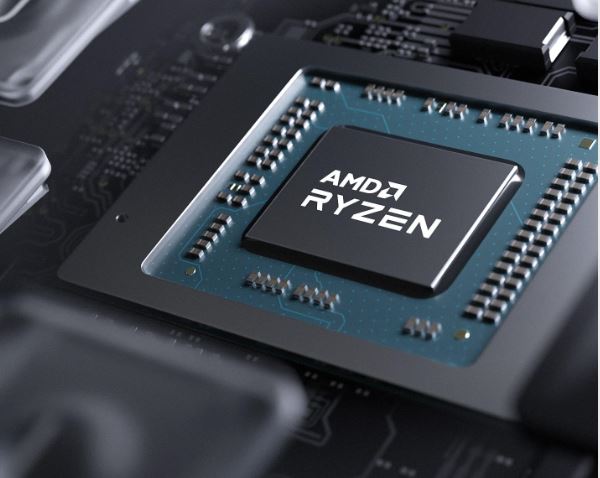
AMD introduced its new Ryzen 5000 C-Series processors today, bringing the company's Chromebook CPU family up to speed with the Zen 3 architecture and 7nm process. The four new 15W chips deliver up to eight x86 cores, a first for Chromebooks, and come armed with the Radeon RX Vega graphics engine with up to eight GPU cores. Despite a high-performance focus for what have traditionally been low-power Chromebooks, AMD claims its chips provide up to almost twice the battery life of Intel's competing Tiger Lake models.
AMD plans for the 5000 C-Series to address a new higher-tier class of Chromebooks replete with the highest-end accommodations, like premium screens and designs, while the company's existing 3000 C-Series chips will continue to address mainstream and entry-level tiers.
AMD's first foray into tailor-made CPUs for Chromebooks came back in 2020 with the Ryzen and Athlon 3000 C-Series chips that wielded the first-gen Zen architecture and the 14nm process, so today's step up to Zen 3 and 7nm marks a big step forward for all facets of performance and power consumption and efficiency.
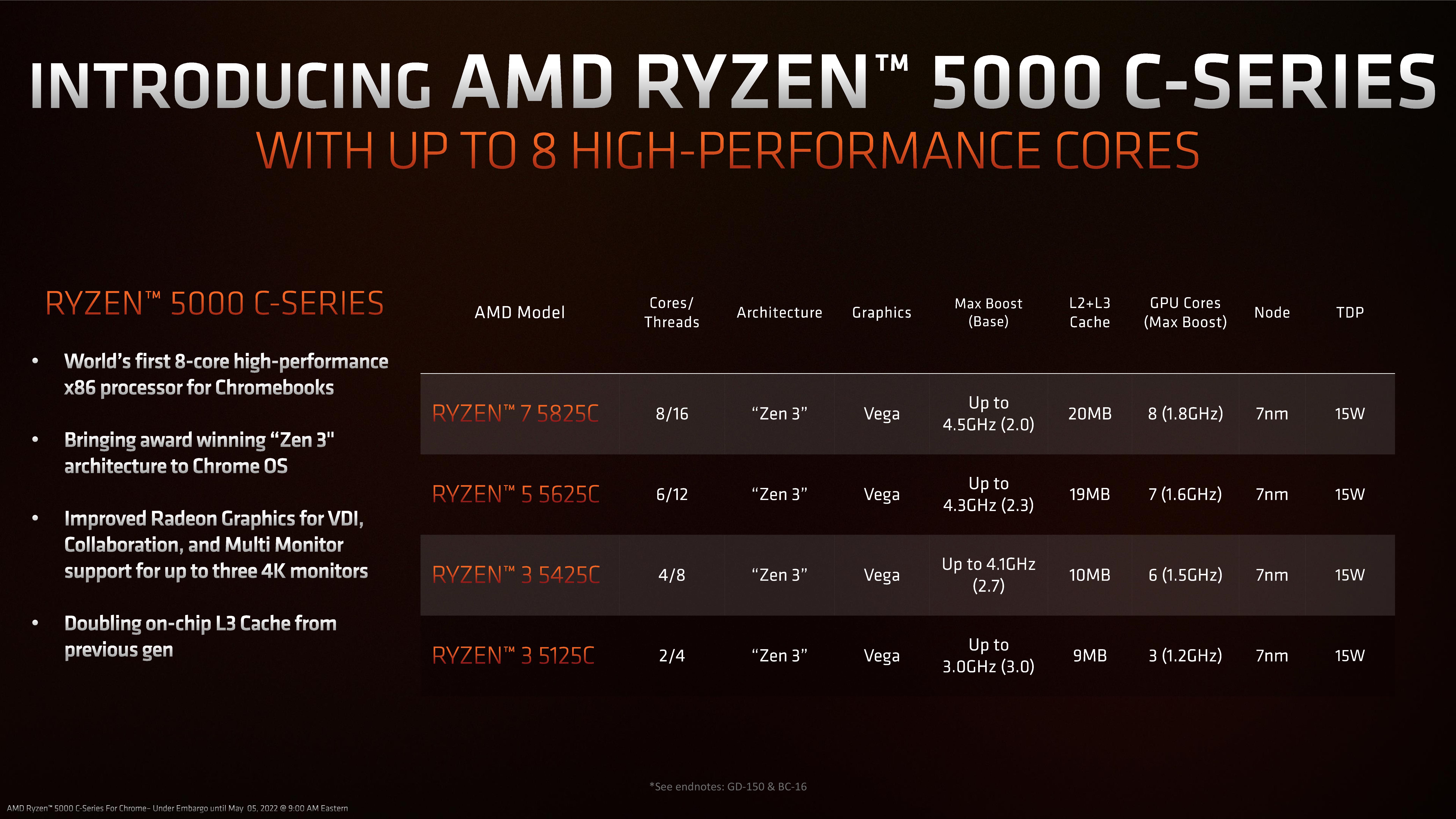
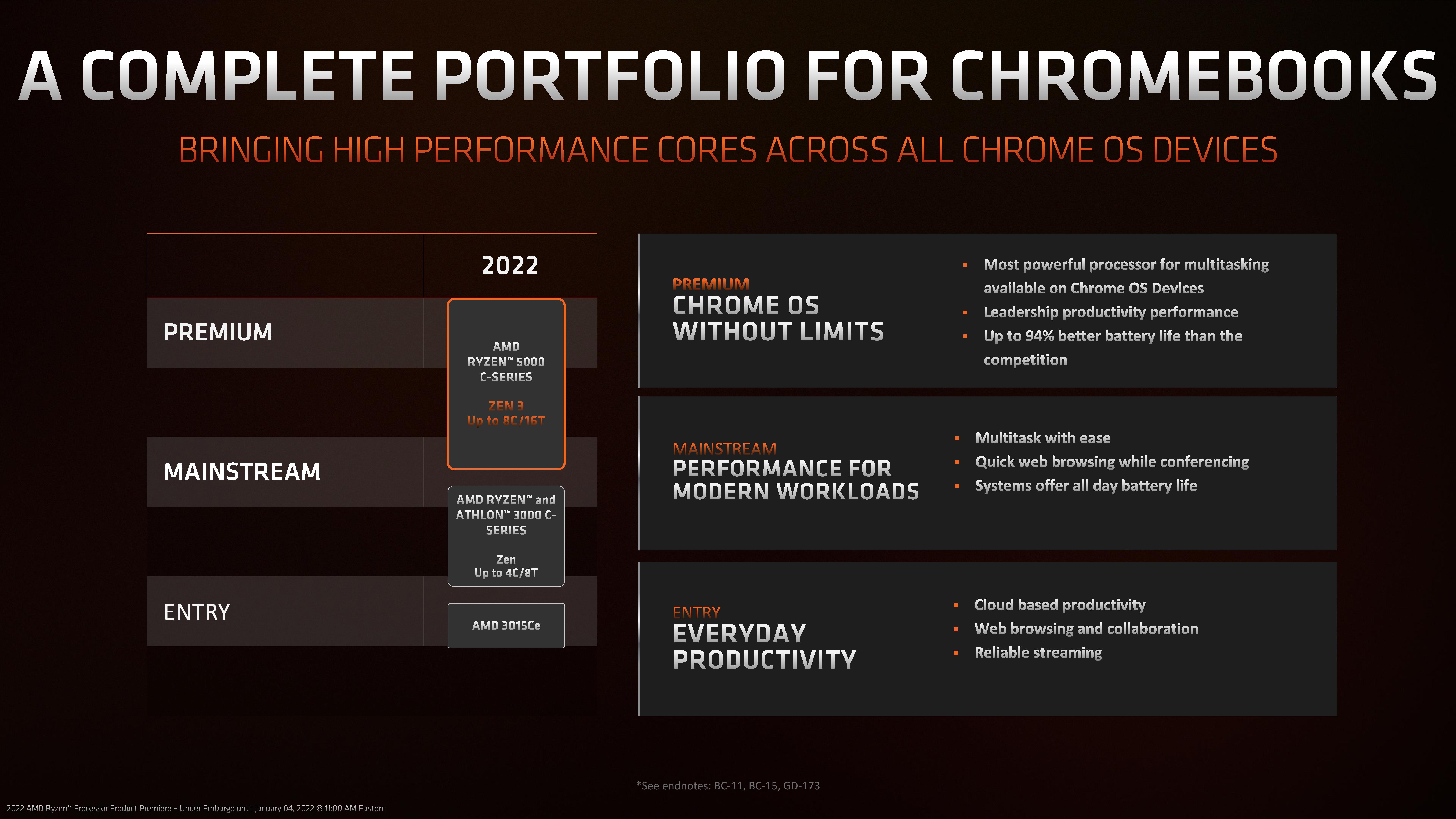
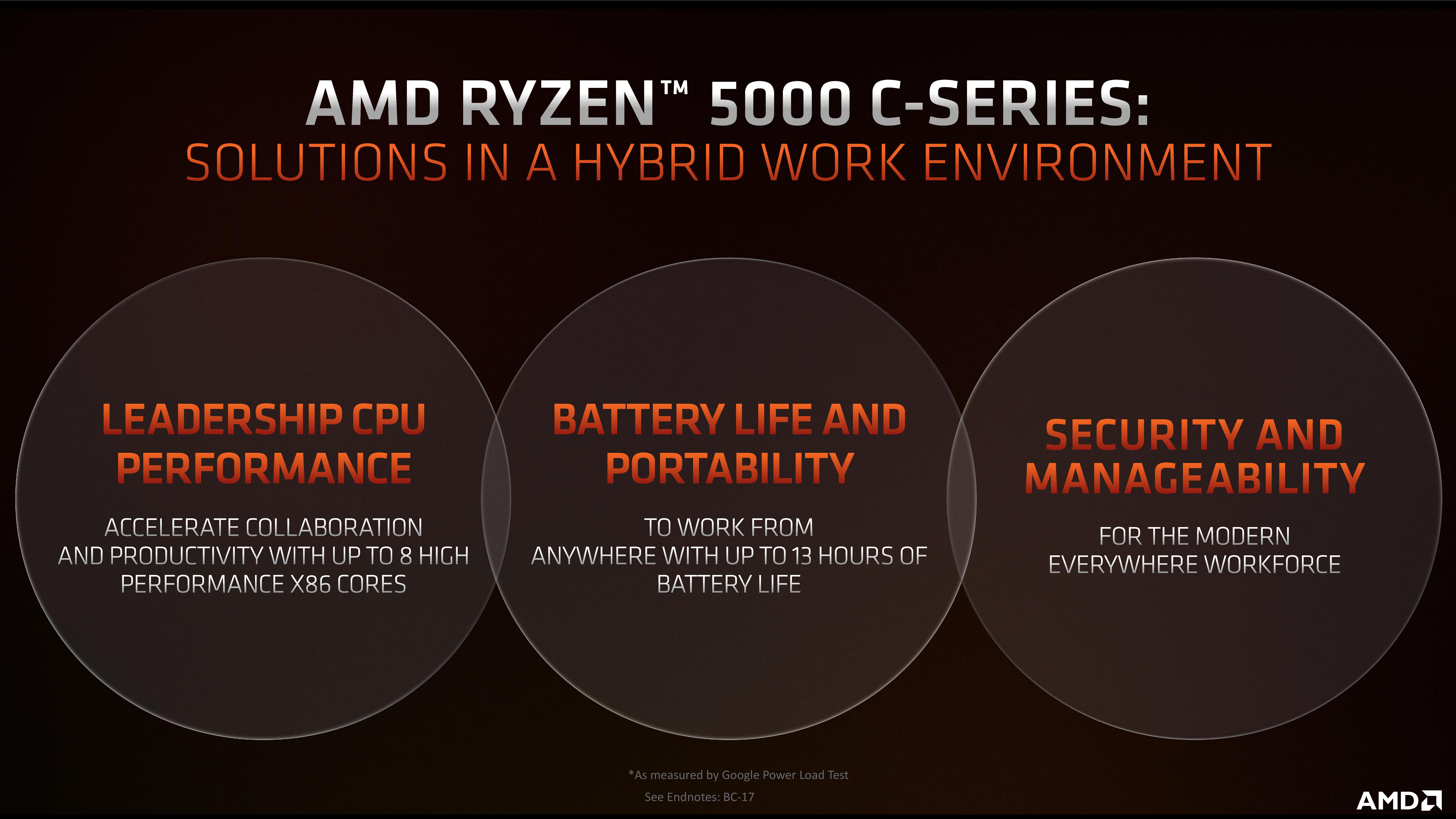
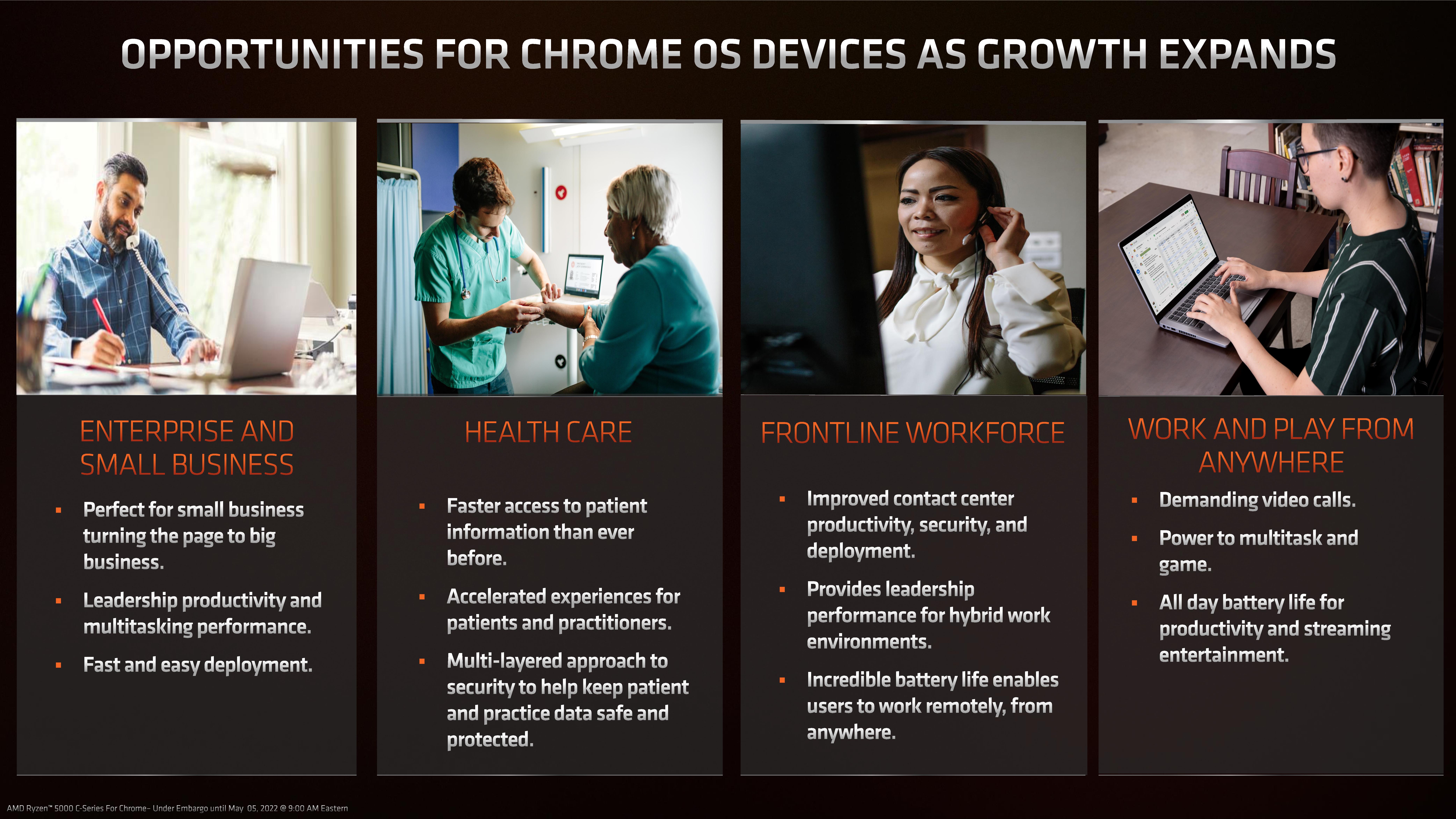
As before, most of the 15W Ryzen 5000 C-series chips come as rebranded versions of AMD's other mobile products, in this case, the Ryzen 5000 U-series, with AMD's rationale for the new branding being a clear separation of the Windows- and Chromebook-branded chips.
We do see slight differences in clock rates between the Chromebook-optimized variants and their U-series siblings, with 100 MHz higher CPU boost frequencies traded for a 100 to 200 MHz reduction in peak GPU clock rates. However, the Ryzen 3 5125C stands as an exception - there doesn't appear to be a dual-core quad-thread counterpart in the existing Ryzen 5000 U-series lineup.
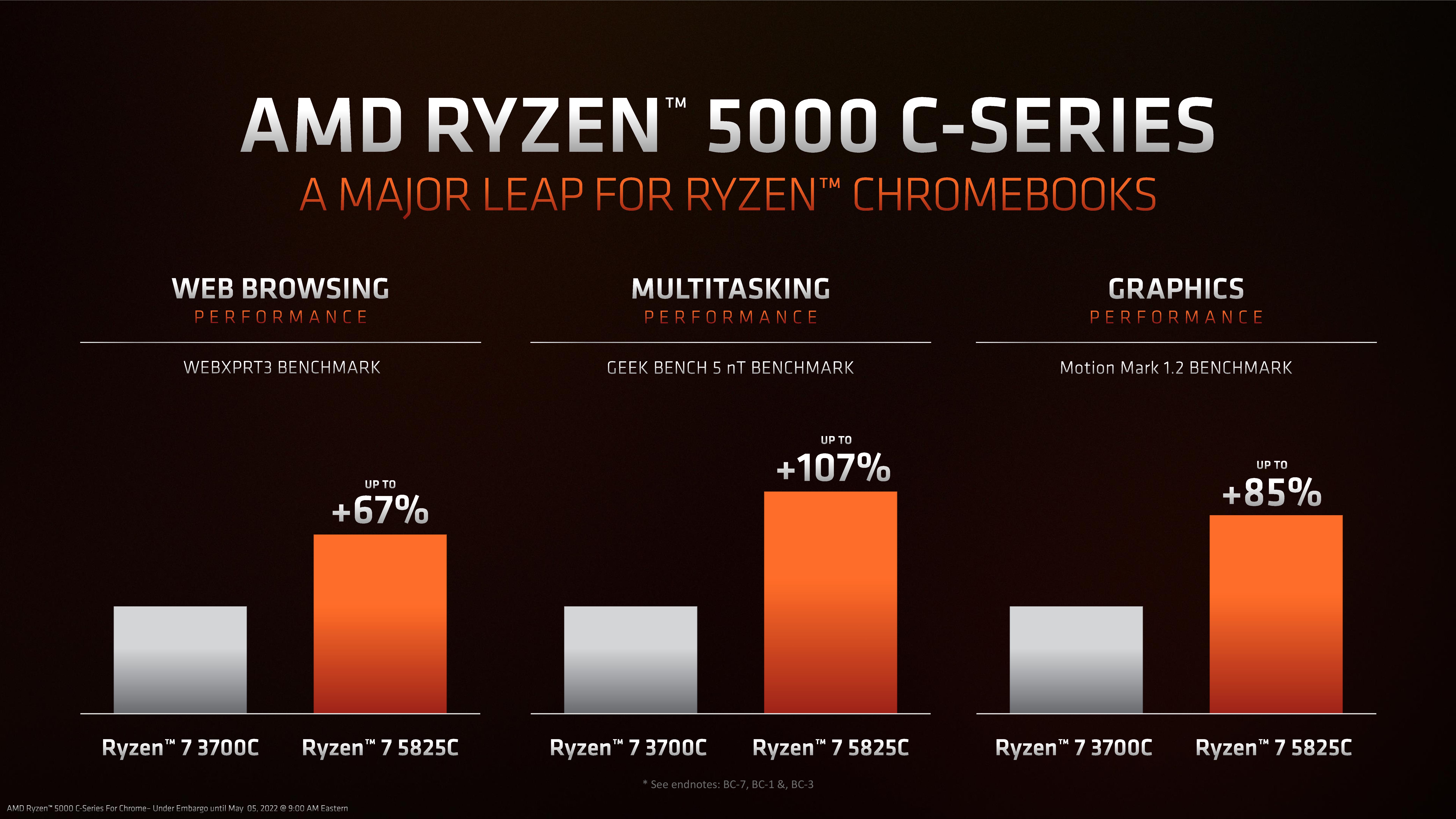
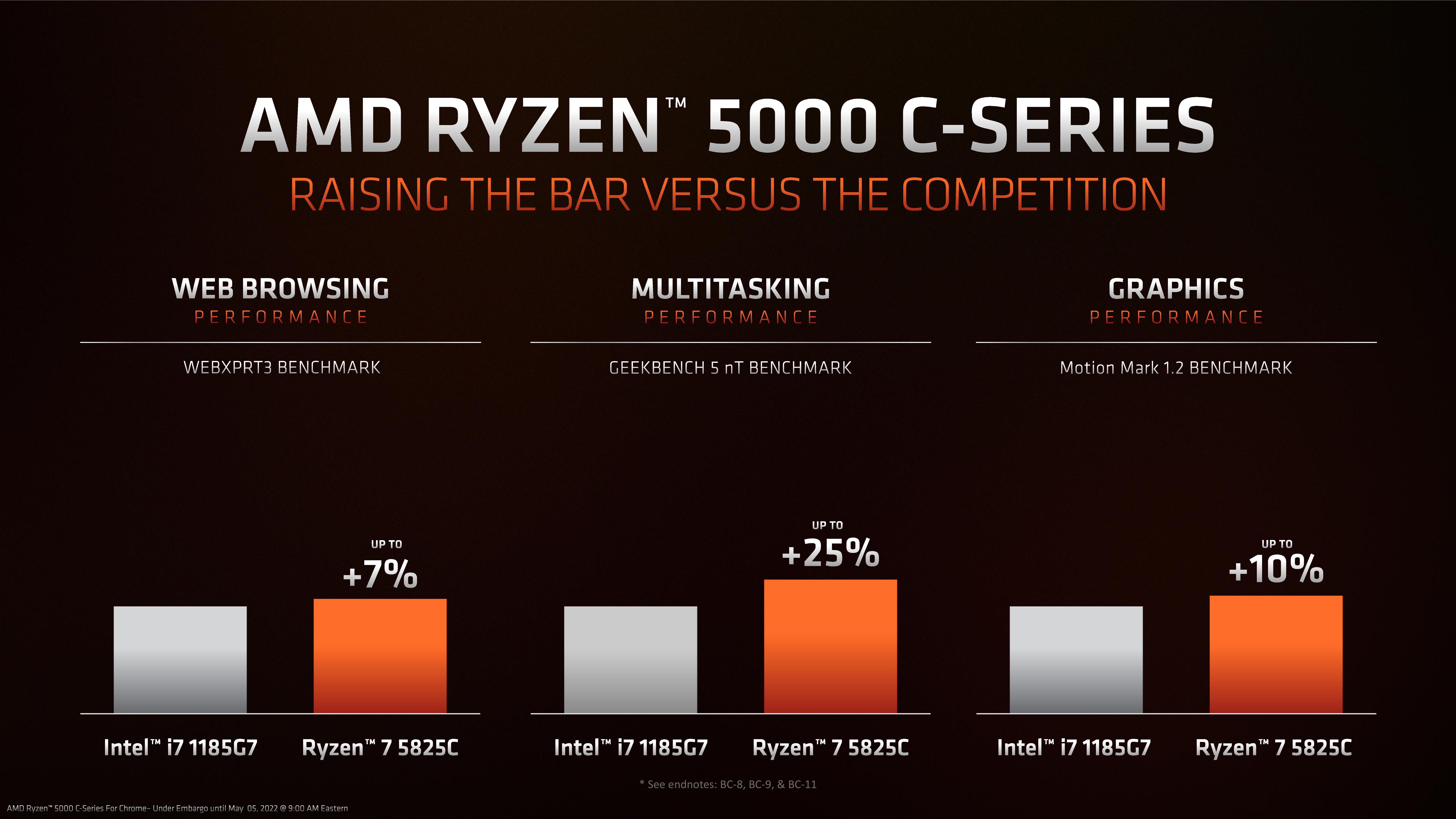
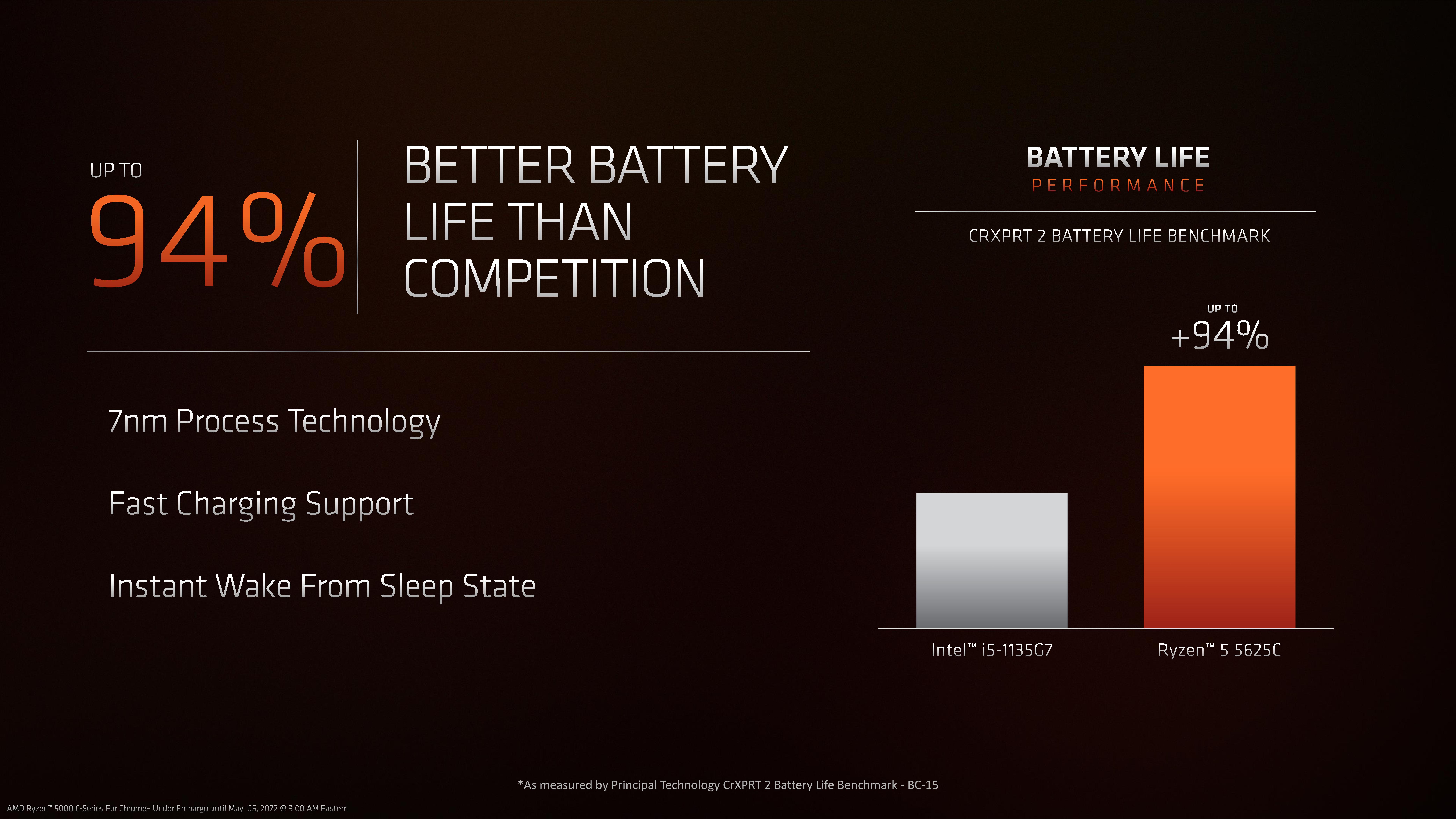
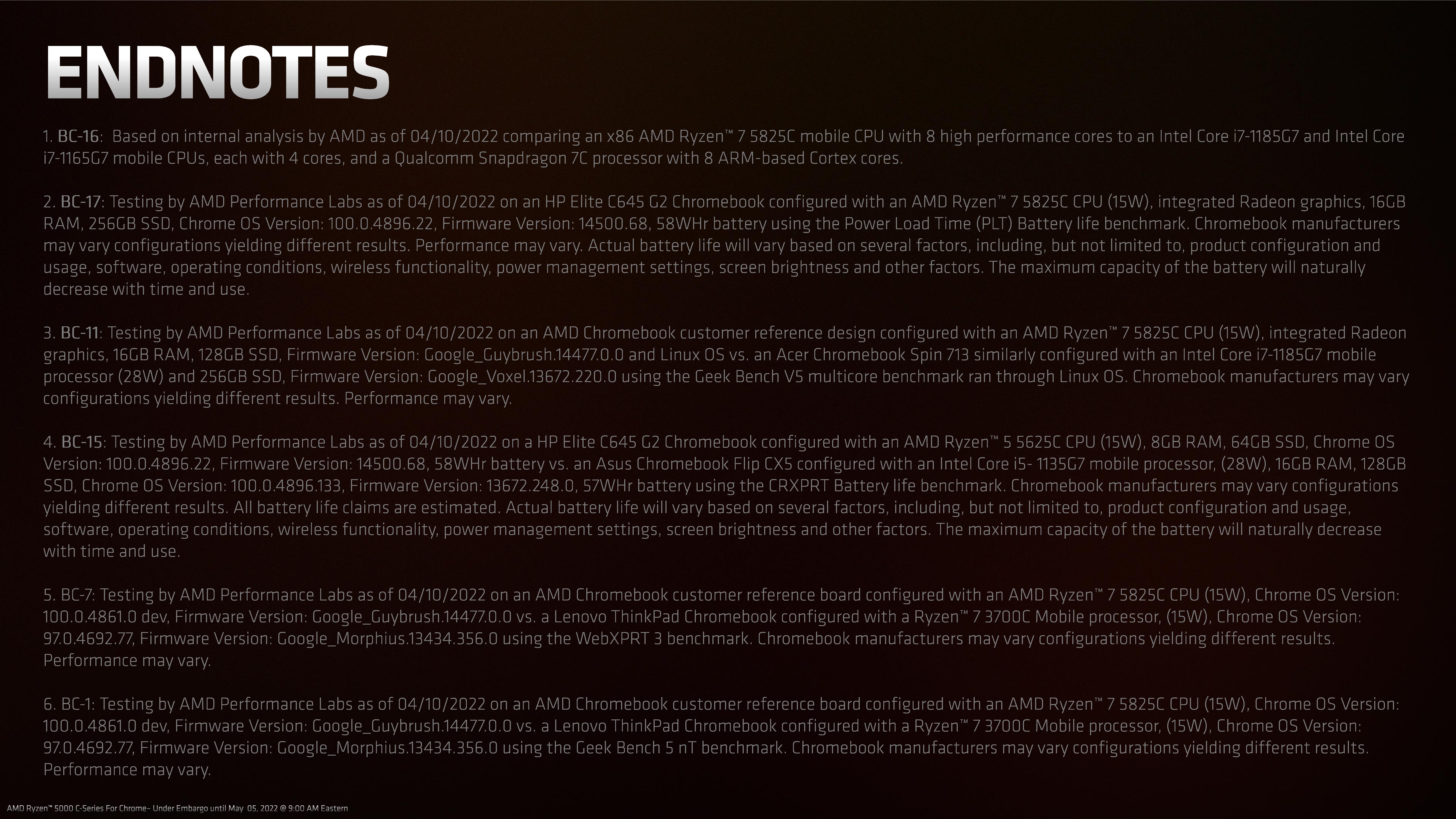
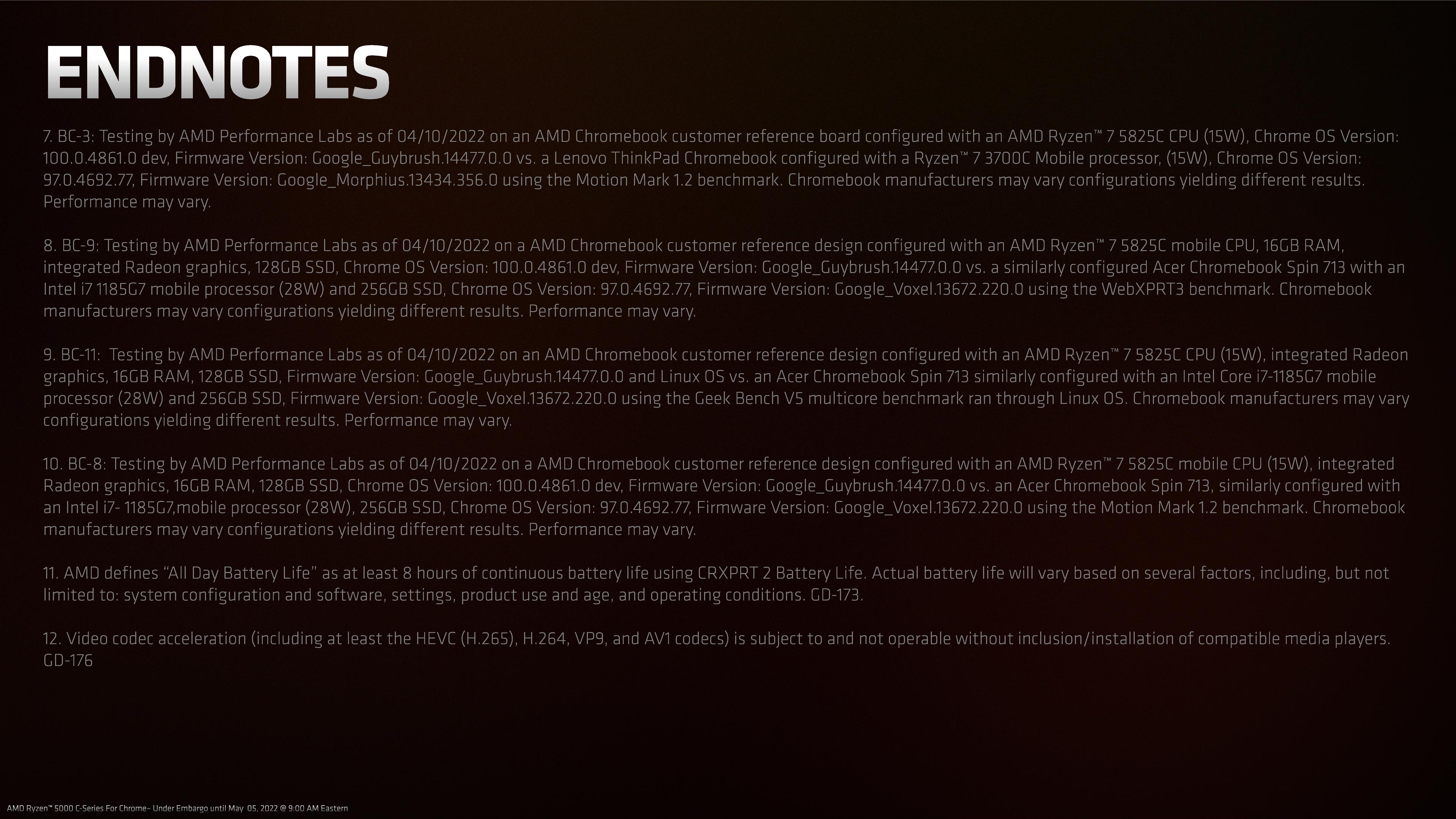
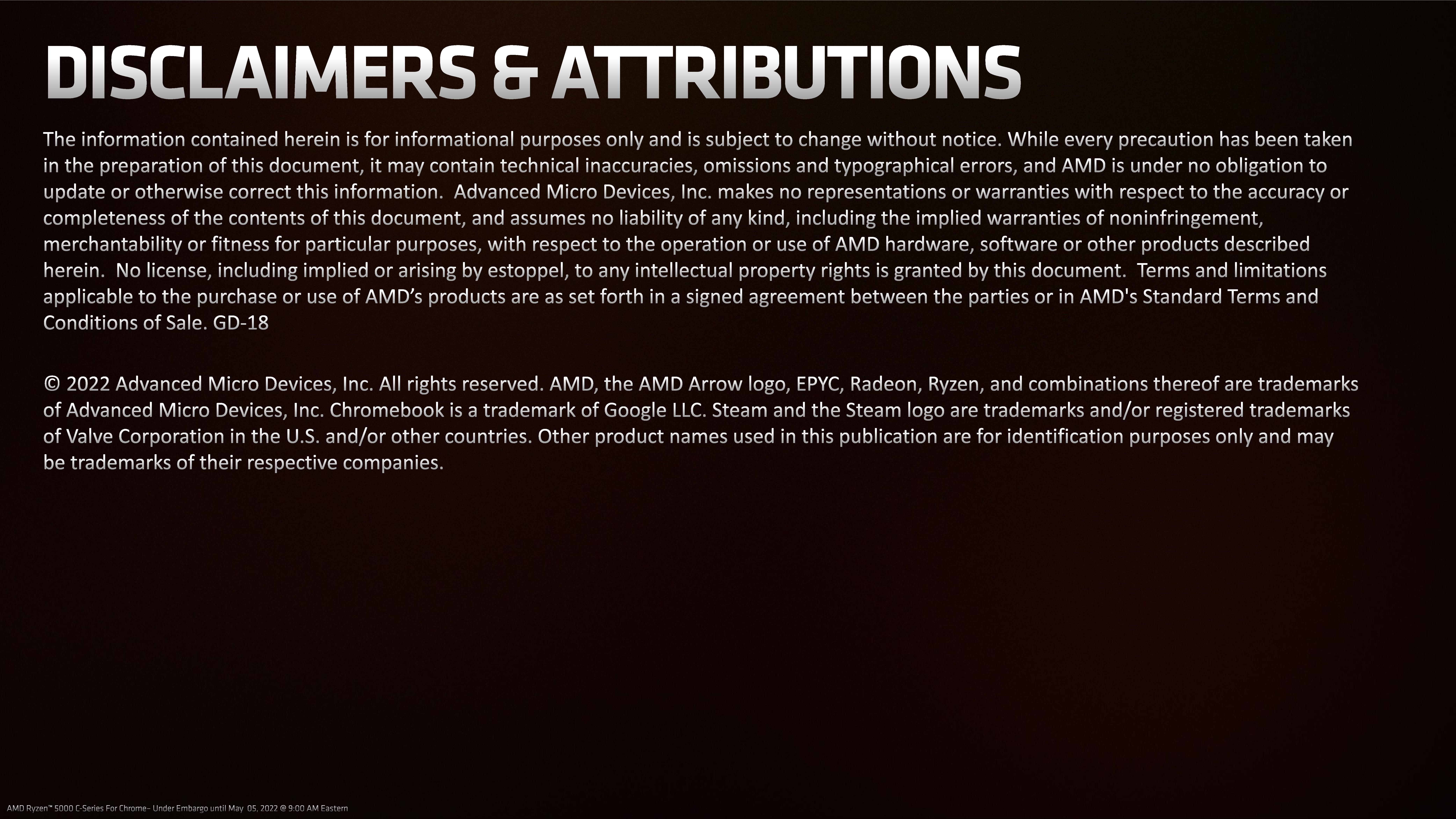
As with all vendor-provided specs, take these with a grain of salt. We've included the test notes at the end of the album for your perusal.
Naturally, the jump up to eight cores will drastically improve performance in threaded workloads, while Zen 3's IPC gains will offer tangible advantages over AMD's Ryzen and Athlon 3000 C-Series chips in single-threaded work. The Radeon RX Vega graphics engine also touts the same optimizations for 7nm as we see with the laptop chips, so it will provide huge gains over 3000C's older 14nm Vega.
Against its own Ryzen 7 3700C, AMD touts that the Ryzen 7 5825C delivers a 67% increase in the web browser Webxrt 3 benchmark, indicative of performance trends in single-threaded work. AMD also claims a 107% improvement in the Geekbench 5 multi-threaded test, but this benchmark isn't really indicative of performance in real-world multi-threaded workloads, so take that with an extra helping of salt. Finally, given that most games played on a Chromebook will be in the browser, AMD claims an 85% improvement in the web browser-based Motion Mark benchmark (this shouldn't be considered a good litmus test for intense graphics work, though).
We have yet to see Intel's Alder Lake -N variants come to the Chromebook market, so AMD squares off with Tiger Lake. AMD compared the 5825C to the Intel i7-1185G7, claiming a 7% advantage in Webxprt 3, 25% advantage in the threaded Geekbench 5 sub-test, and a 10% advantage in the Motion Mark benchmark. We should expect this comparison to change drastically when Intel's Alder Lake-N arrives at an unspecified date.
Perhaps most important for what has traditionally been a low-power segment with generous battery life, AMD claims the Ryzen 5 5525C provides up to 94% more battery life than the Intel i5-1135G7 in the CrXPRT2 battery life benchmark (CrXPRT is a Chromebook-specific benchmark from Principled Technologies).
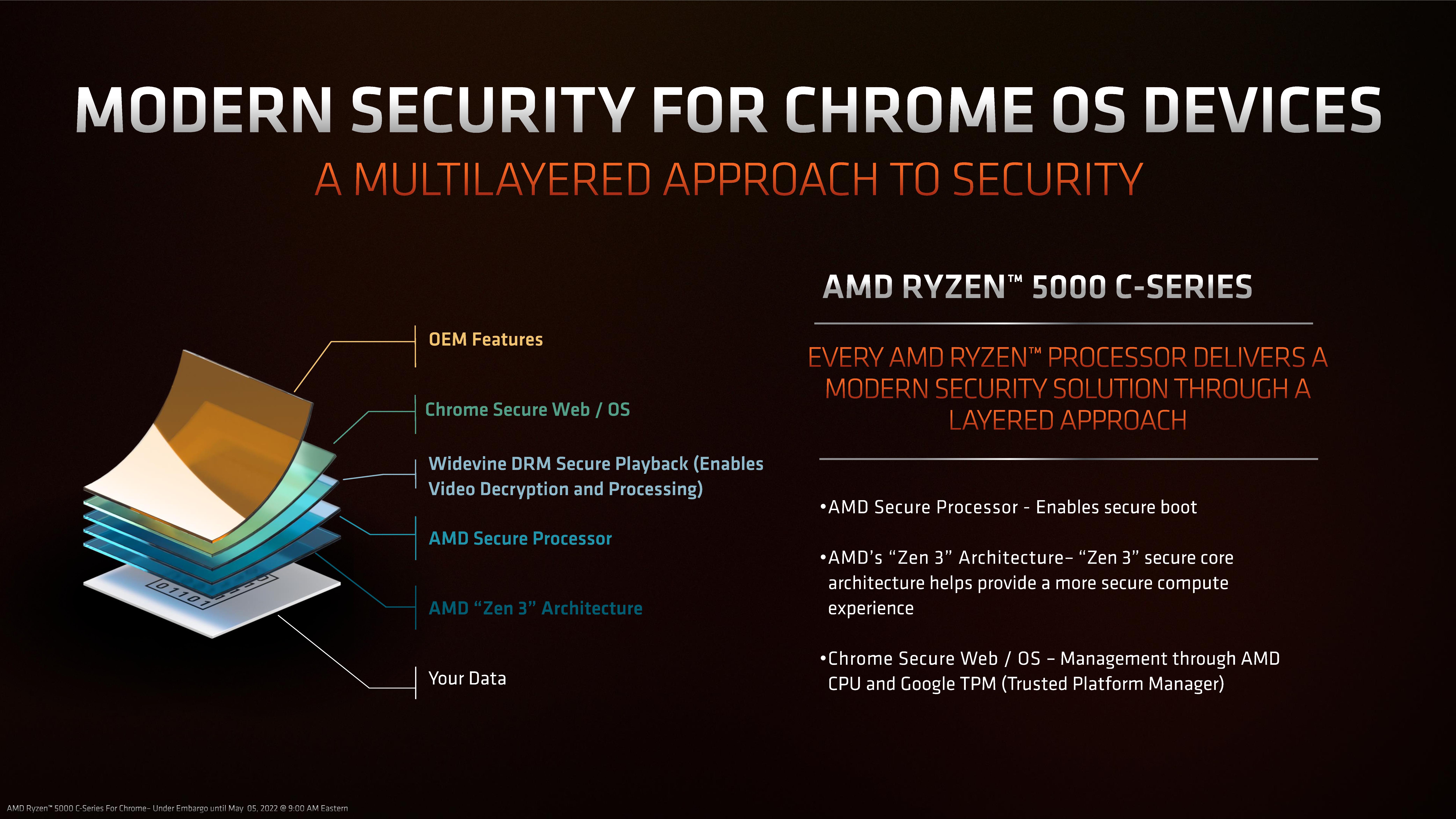
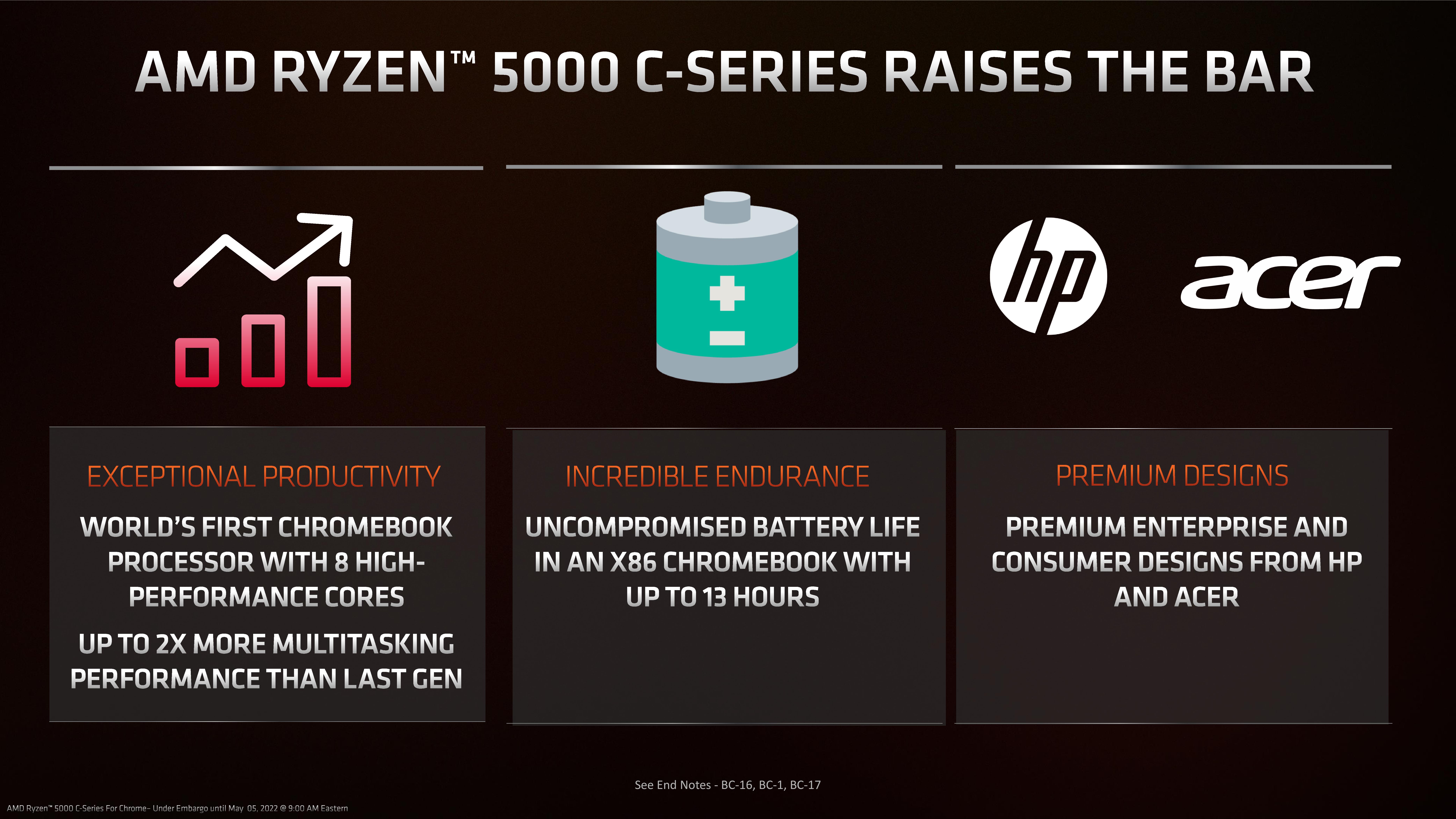
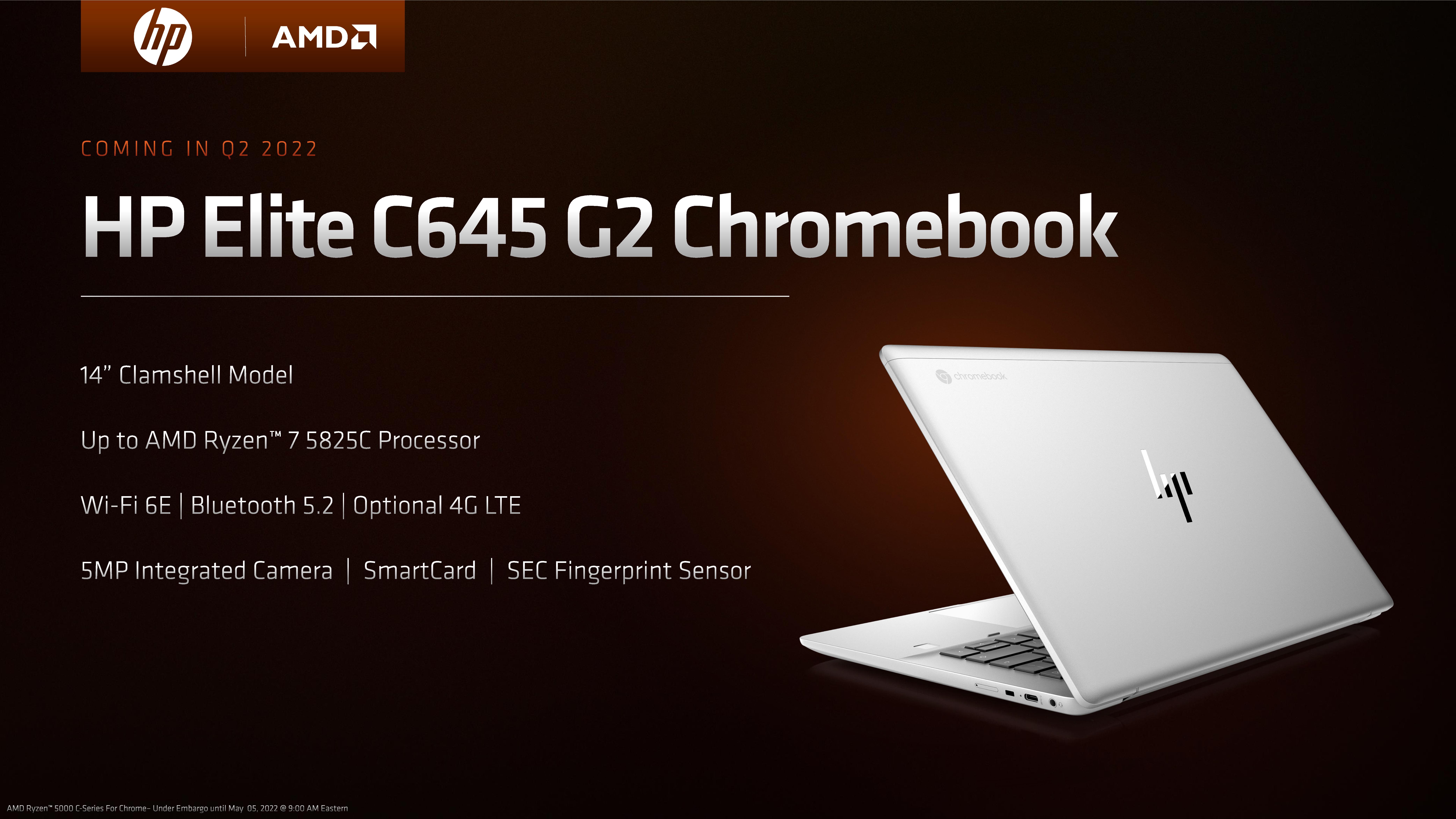
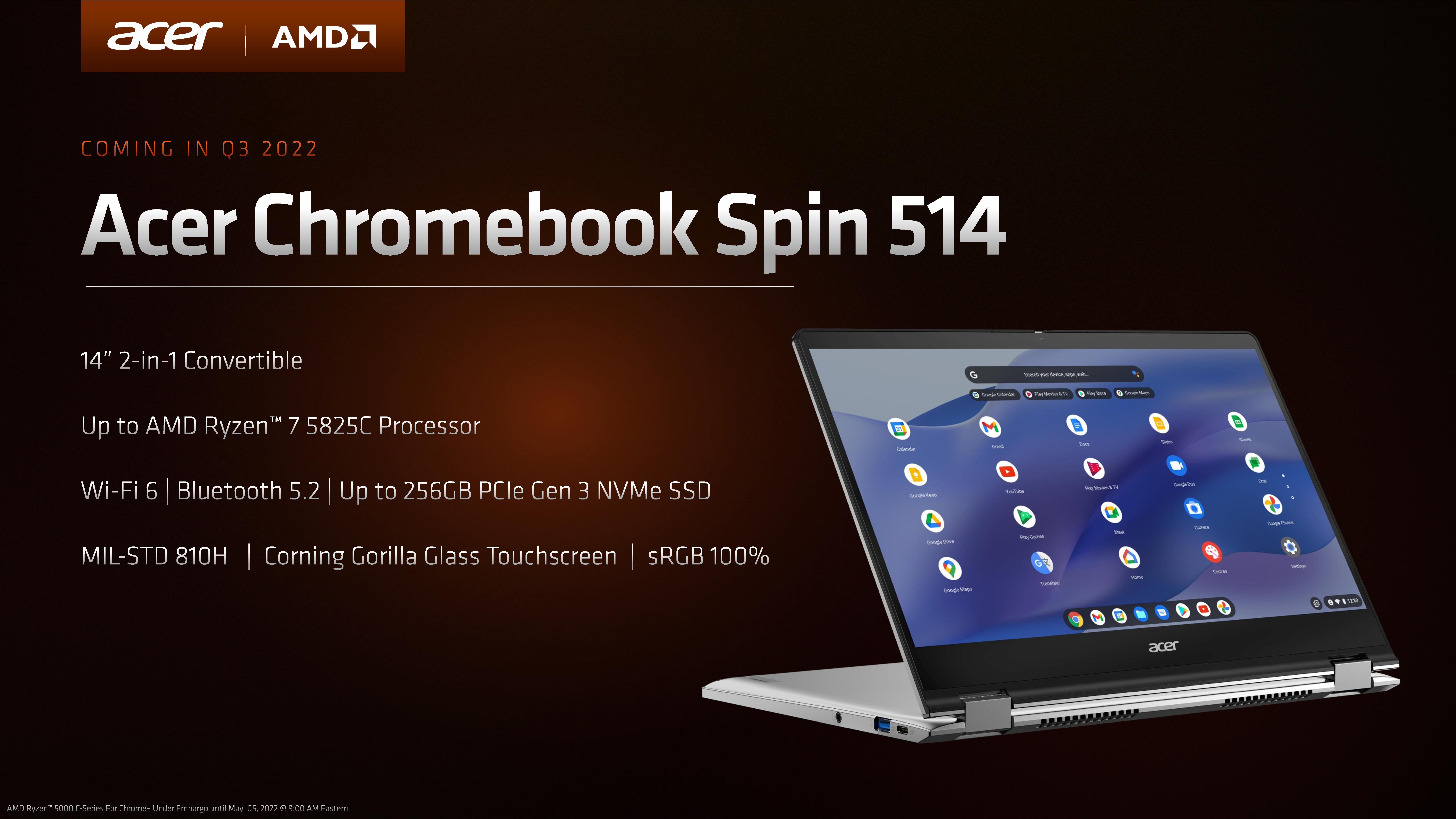
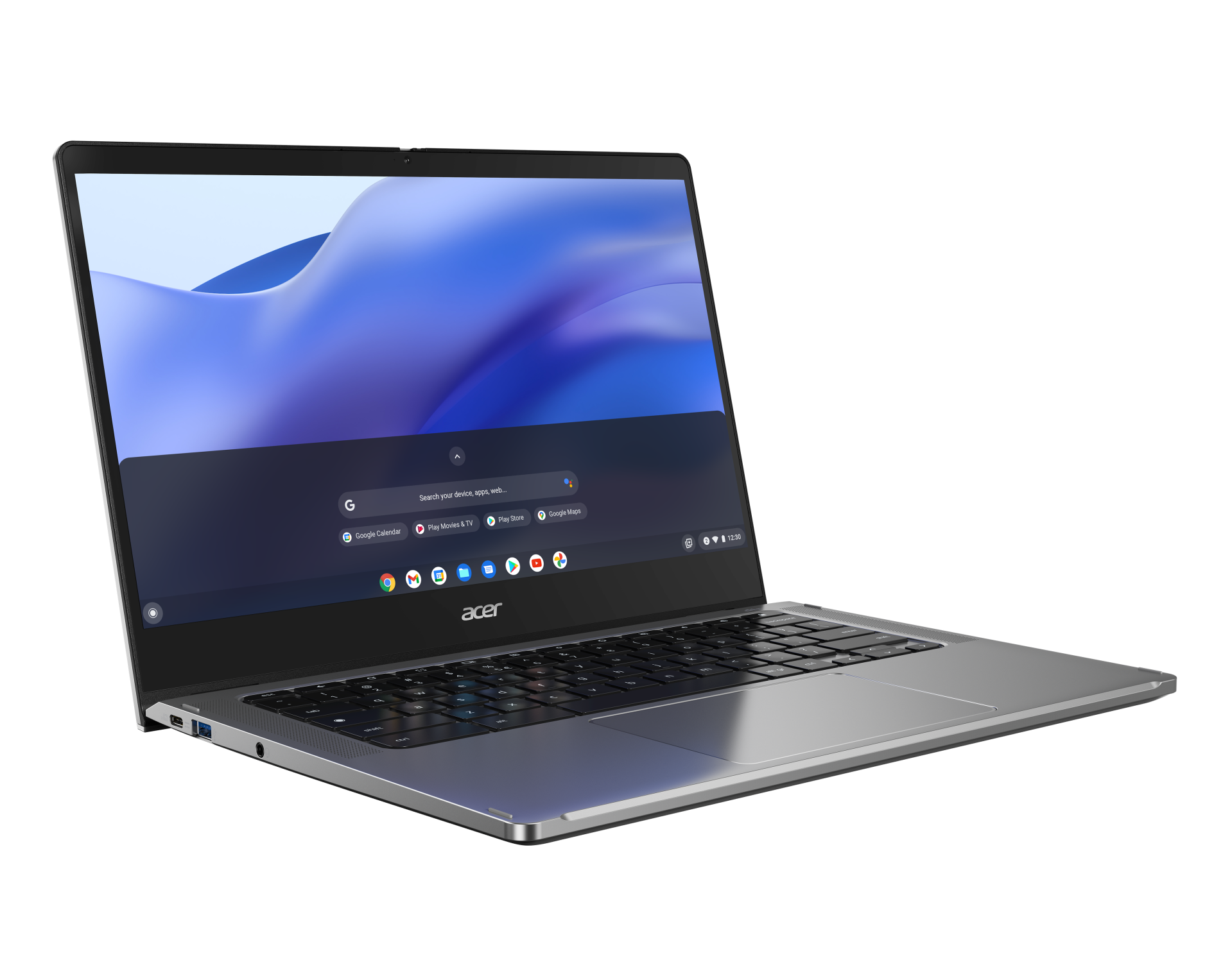
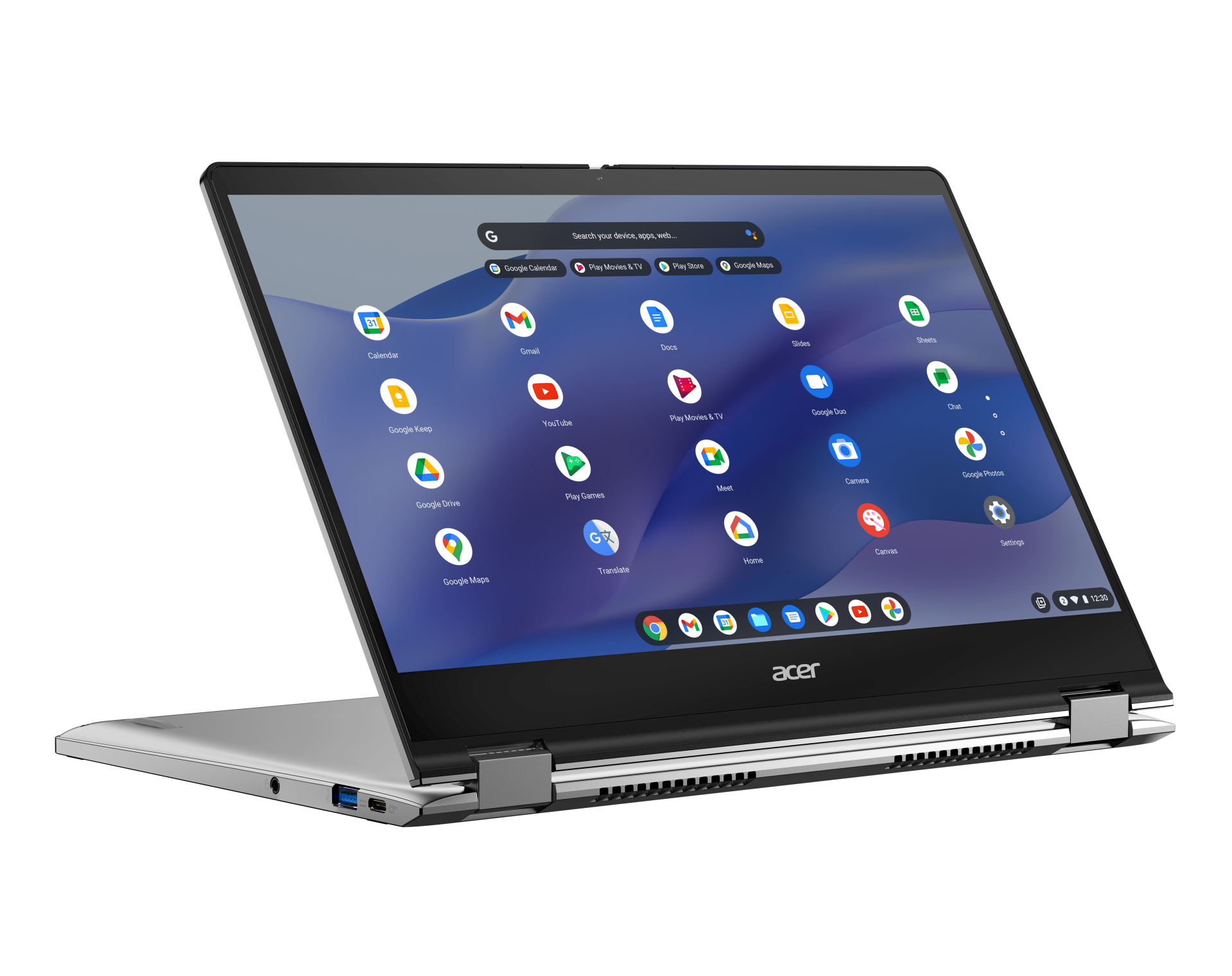
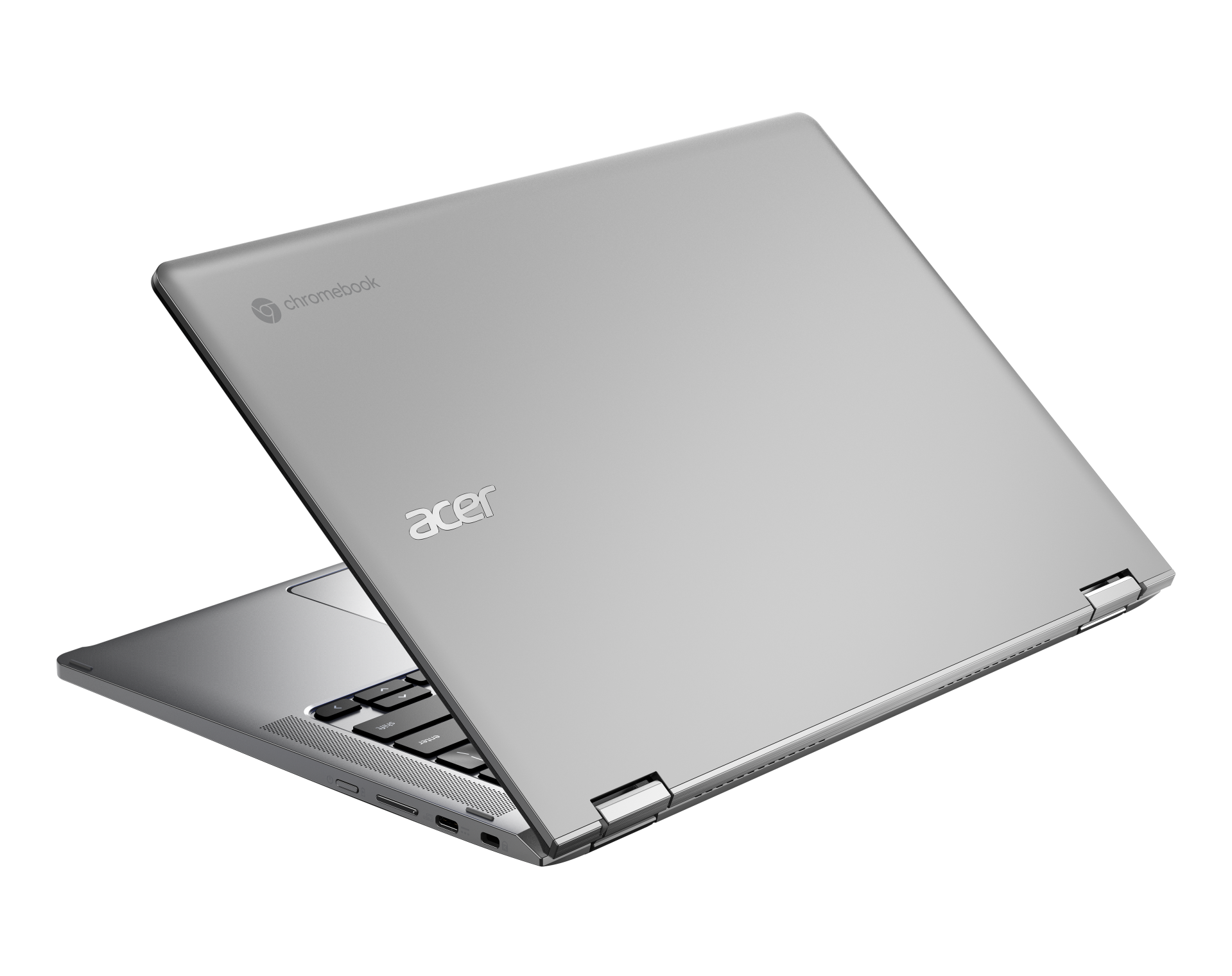
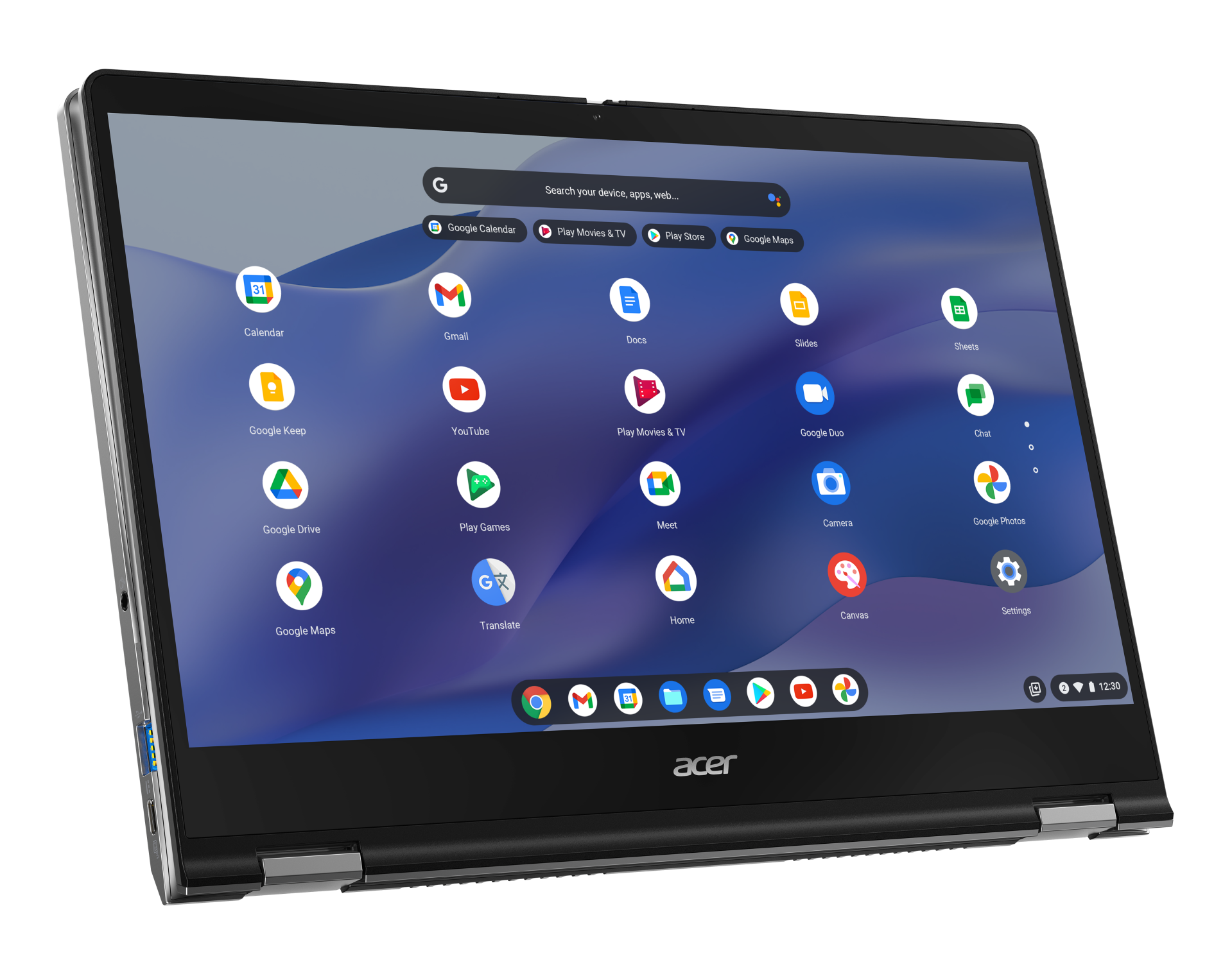
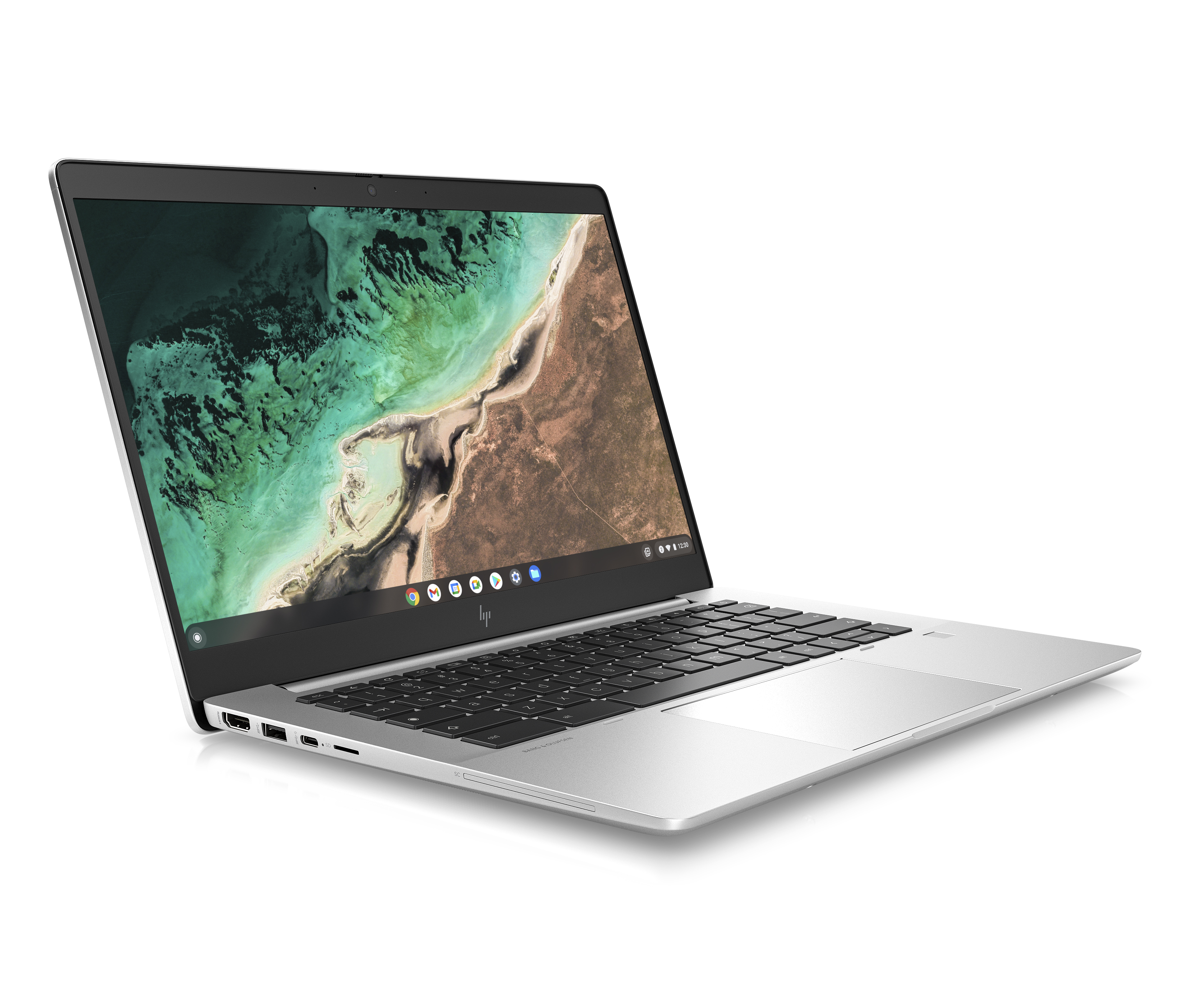
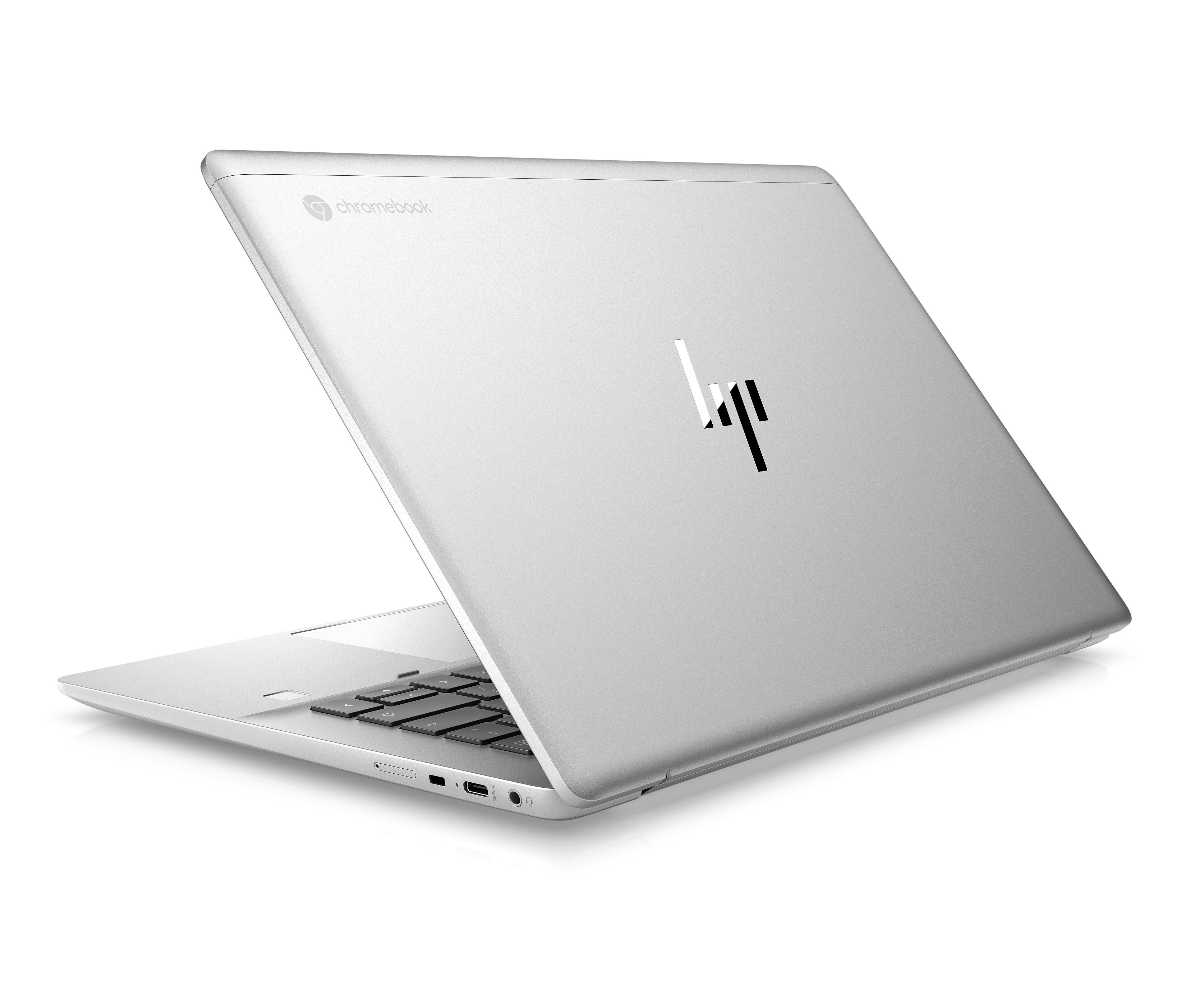
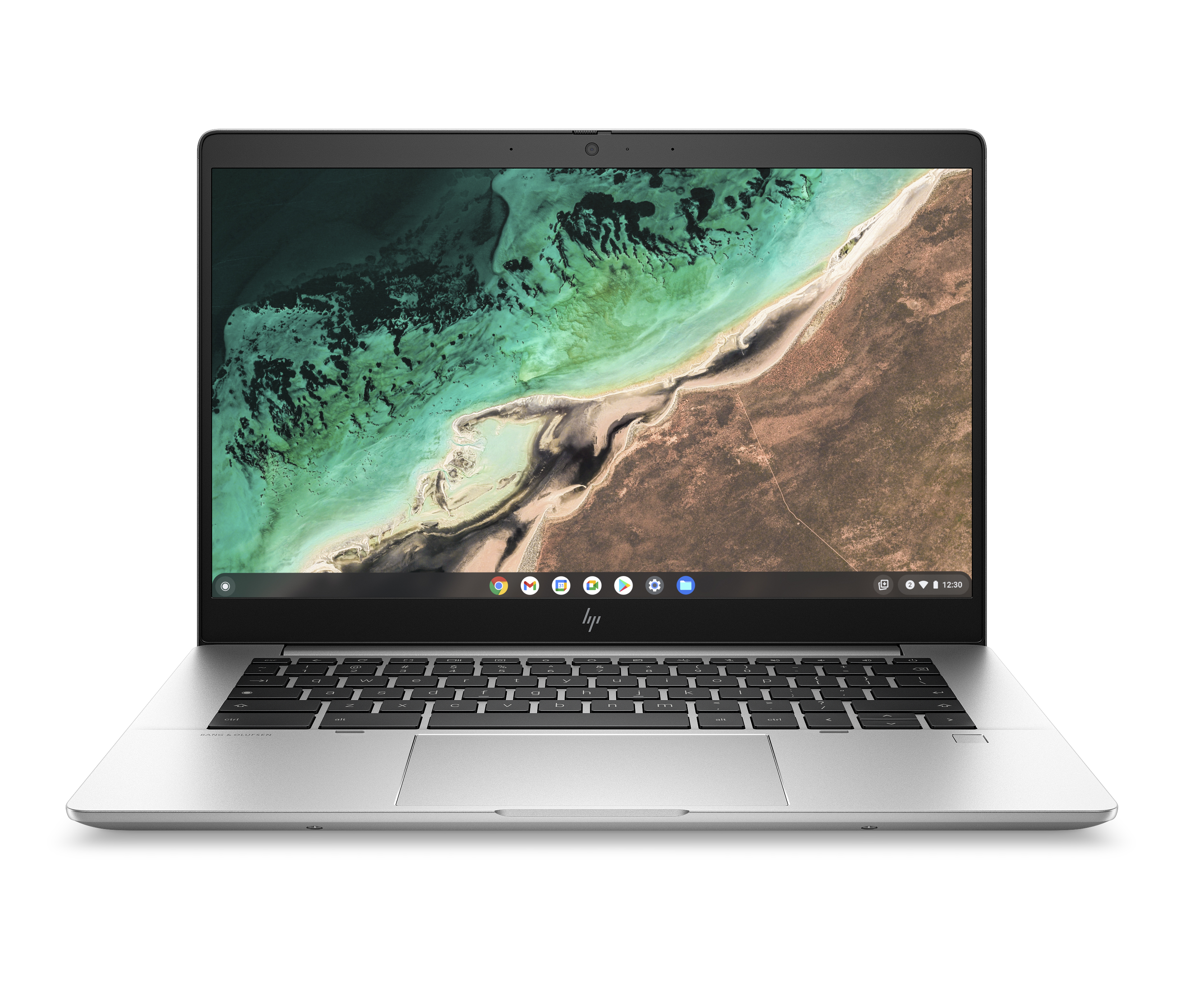
AMD's Ryzen 5000 C-Series has the same security features as its Pro series lineup, including secure boot, AMD secure processor, and support for Google's TPM management.
AMD touts the 14" clamshell HP Elite C645 G2, which launches today, as an example of the higher-end offerings enabled by its new chips, while the Acer Chromebook Spin 514, also announced today, represents a premium 14" 2-in-1 convertible. Both come powered by AMD's flagship Ryzen 7 5825C.
AMD's initial entrance into the Chromebook market with the Ryzen and Athlon 3000 C-Series back in 2020 couldn't have come at a more opportune time, but not for the best reasons: Back then, we were in the opening stages of the pandemic and the resultant lockdowns. That series of unfortunate events pushed schooling back to the home for many students, resulting in an unprecedented surge in Chromebook sales.
Naturally, Chromebook sales have plummeted by 69% year-over-year (per IDC) as the worst of the lockdowns recede in most regions, but AMD's decision to enable a higher-tier of Chromebook could be lucrative moving forward — extracting more margin from what has historically been a low-margin segment makes plenty of good business sense. These higher-end chips will also be needed to fend off Intel's x86 Alder Lake-N chips, not to mention the Arm competition from Qualcomm and Mediatek, over the coming year.
Get Tom's Hardware's best news and in-depth reviews, straight to your inbox.

Paul Alcorn is the Editor-in-Chief for Tom's Hardware US. He also writes news and reviews on CPUs, storage, and enterprise hardware.
-
rluker5 To compete with low cost, low power Intel Atoms for chromebook use?Reply
Do they know what segment they are in? It is the lowest price segment with low performance demands and high battery life demands.
A 15w expensive chip is the wrong chip for the job. They just have to run a browser OS and have kids keep them on all day.
Why is AMD bringing the bling to chromebooks? Nobody asked for that. A 15w 8c is like putting a V8 in a Chevy Spark and charging $25k for it. But I suppose if AMD has to throw them away at a loss like Intel did with windows tablet Atoms you might be able to score a deal if you could install Windows. -
Alvar "Miles" Udell Put an 8 core CPU and a 4K 100% Adobe RGB HDR1000 touch screen with THX certified speakers on a Chromebook with a magnesium chassis that weighs 100g and is a thick as a piece of paper and it will still be a Chromebook.Reply -
jacob249358 Chrome is going to be just a browser with the most basic stuff for another few years. The point of them is being cheap for people that just want to watch movies and answer emails or for school. Not sure if google has something big coming with chrome os but it would be fun to see someone compete with windows (Not really counting linux)Reply -
tehodler I guess nobody else in the comments here is using Linux apps on their chromeooks?Reply
Chrome OS is the slickest, most trouble free OS I've ever used. Updates don't interfere with anything I'm doing and don't require multiple reboots (or any reboots). I'd love more powerful hardware as long as the price is right. The few high-end chromebooks seem to offer lower specs than similarly priced Windows machines. I'll pay a small premium to use my favorite OS but if the cost is too high, I'll buy a Windows machine and put Linux on it. -
jacob249358 Reply
Chrome OS updates require reboots. And I think the linux apps thing is a very small portion of people. But chrome OS is very smooth and simple, I enjoy it myself.tehodler said:I guess nobody else in the comments here is using Linux apps on their chromeooks?
Chrome OS is the slickest, most trouble free OS I've ever used. Updates don't interfere with anything I'm doing and don't require multiple reboots (or any reboots). I'd love more powerful hardware as long as the price is right. The few high-end chromebooks seem to offer lower specs than similarly priced Windows machines. I'll pay a small premium to use my favorite OS but if the cost is too high, I'll buy a Windows machine and put Linux on it. -
escksu I just feel that 6/8 core cpus are way overkill for chrome books. 4 core will do the job nicely...Reply
Btw, ARM will be biggest competitor in the chromebook segment. I am not sure if both intel and amd could compete in time to come... -
hannibal I have used slow Chromebook and fast Chromebook and yeah if you need that speed, it is worth of paying for it!Reply